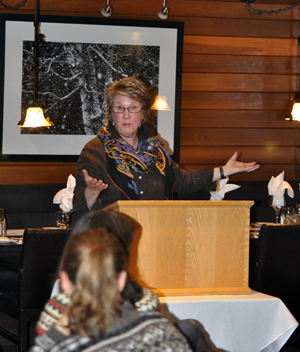

By David F. Rooney
Banking on the importance of creating “a knowledge-based economy in BC,” BC Liberal leadership hopeful Dr. Moira Stilwell promises to invest $10 million in establishing a national mountain search and rescue training institute in Revelstoke — if she becomes premier.
Stilwell, MLA for Vancouver-Langara and Minister of Advanced Education and Labor Market Development, proposes to create the institute with the active participation of Okanagan College, the Canadian Avalanche Centre, the Canadian Association of Mountain Guides, the RCMP, HeliCat Canada, volunteer search and rescue groups and other organization involved in emergency response and mountain tourism.
“You are the Silicon Valley of snow,” she told a small crowd at the Regent Inn at noon on Monday. “A national mountain search and rescue training institute could harness the experience we already have, provide a uniform standard of training and increase the number of qualified safety personnel across Canada.”
It would also, said the Calgary-born radiologist and nuclear medicine physician who worked at BC Women’s Hospital for nearly a decade, contribute mightily to the development of the kind of “knowledge-based economy” that British Columbia needs to remain an advanced and economically successful region.
“You have a perfect set of ingredients in Revelstoke,” she said, noting that the confluence of a highly skilled SAR unit, the Canadian Avalanche Centre and a concentration of world-class mountain guides makes it an ideal location of this kind of institute.
It might also stimulate local and regional economic growth and attract researchers in other fields of study.
Jim Barmby, dean of Okanagan College’s Shuswap-Revelstoke region, said the proposal is “a natural fit for the college.”
“The college has long wanted a certification program for Revestoke,” he said after Stilwell announced her proposal. This could provide an educational opportunity built on local expertise for students from Revelstoke, the rest of Canada and abroad.
Ian Tomm, the Avalanche Centre’s executive director, said such an institute could “drive enhanced professional professional-level mountain rescue training in BC.”
The Canadian Avalanche Association offered its first professional training program in 1971 and has offered avalanche training programs for 20 years and, in fact, will be hosting the first meeting outside Europe of a committee from the International Commission for Alpine Rescue in March.
Of course, Stilwell’s promise is just that — a promise from a politician seeking high office. But it is also the first indication of interest and support for the community’s long-held dream of establishing some kind of research institute in Revelstoke.
Discussions on this general subject have been sporadically ongoing in Revelstoke since at least 2001 but have never borne fruit. Stilwell’s proposal and promise is a serious one and deserves the attention and support of the community at large.



